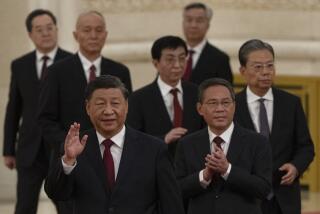Zhao Moves to Limit Attack on Liberalism : China’s Premier Says Drive Will Apply Only to Members of Party
- Share via
PEKING — Chinese Premier Zhao Ziyang sought Thursday to set down some well-defined limits to prevent the Communist Party campaign against “bourgeois liberalization” and Western influence from getting out of hand.
Speaking at a ceremony in the Great Hall of the People to celebrate the beginning of the lunar New Year, Zhao said the campaign will apply only to the 44 million members of the party and not to the rest of the people.
Furthermore, he indicated, the campaign will not be carried out in rural areas at all, and its effect will be restrained in factories and other urban enterprises. The thrust of the campaign, he said, will be “in the political ideological field”--that is, among intellectuals and party leaders.
‘Serious Consequences’
“Of course, disciplinary action will be taken, in accordance with the party constitution, against a very limited number of party members who have committed serious mistakes showing serious consequences and who do not observe party discipline,” the premier said.
Zhao was introduced to the more than 4,000 officials in the crowd by Peng Zhen, the 84-year-old chairman of the Standing Committee of the National People’s Congress, who has emerged as the leader of conservative forces in the leadership.
Peng has been calling for an end to departures from party orthodoxy. On Wednesday, in a speech given front-page coverage by the People’s Daily and other party papers, he told writers and artists that they should re-read and study the lectures given to Chinese intellectuals by Mao Tse-tung in 1942.
In those lectures, given at Yenan, Mao said that intellectuals should be “oxen for the proletariat and the masses, bending their backs to the tasks until their dying day.”
Communist Fundamentalism
Peng’s appeal was one of several recent instances in which conservative forces in the leadership have seemed to be developing a sort of Communist Chinese fundamentalism, appealing to values and symbols of the past.
A week ago, a party newspaper cited as a model of thrift and industry the efforts of Chinese workers two decades ago at Daqing, Manchuria. One of the legends of Communist China was born there in the 1960s when workers, braving cold weather and using primitive equipment, brought in a huge oil field where experts had said there was probably little oil. Under Mao, the entire nation was once told to “learn from Daqing.”
Zhao was named acting party leader Jan. 16 after Hu Yaobang suddenly resigned as the campaign against bourgeois liberalization in the party got under way.
Senior Chinese leader Deng Xiaoping was not present Thursday for Zhao’s speech, although the premier several times quoted Deng’s words.
‘Spiritual Pollution’
The attempt to set down limits on the party drive against bourgeois liberalization seems to be aimed at preventing the sort of problems that cropped up in an earlier campaign against Western influence.
In 1983, when the party began a short-lived crackdown on what it called “spiritual pollution,” local officials complied by ordering young people to cut their hair, to stop listening to Western music and to put away Western clothing.
From the start, the new party crackdown on bourgeois liberalization has been different from the attack on spiritual pollution because it is aimed more at Western political ideas than at clothing, music or life styles. Three leading intellectuals have been expelled from the party, and Chinese sources have said that others may be expelled soon.
Still, there have been signs that the campaign could spread throughout the society. Even at cultural events such as Peking’s main New Year’s fair at Ditan Park, signs over the entrances urge, “Oppose Bourgeois Liberalization.”
In his speech Thursday, Zhao said the drive against bourgeois liberalization will not be allowed to turn into a widespread political movement like the Cultural Revolution of the late 1960s and early 1970s.
“In carrying out education in opposing bourgeois liberalization, no practices of leftist mistakes will be repeated or will be permitted,” he said. “ . . . We will not hurt, but will sincerely unite, the overwhelming majority, including the majority of comrades directly engaged in the political ideological field.”
More to Read
Sign up for Essential California
The most important California stories and recommendations in your inbox every morning.
You may occasionally receive promotional content from the Los Angeles Times.













